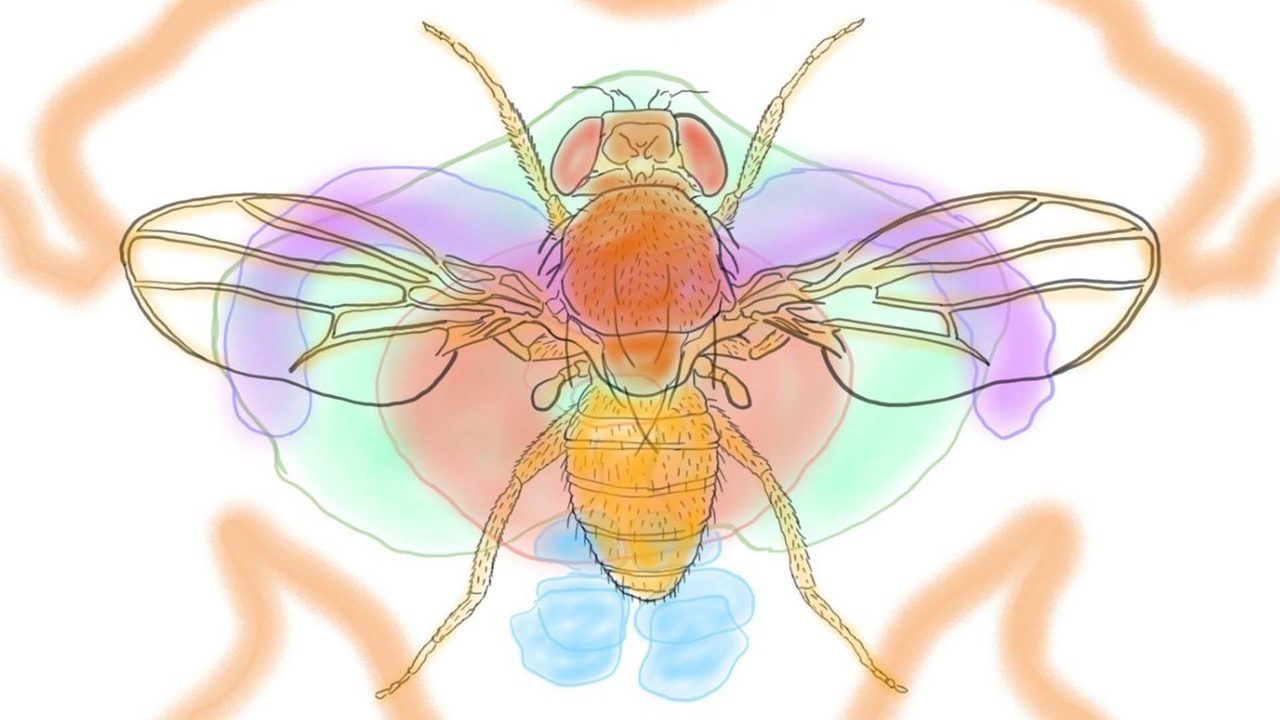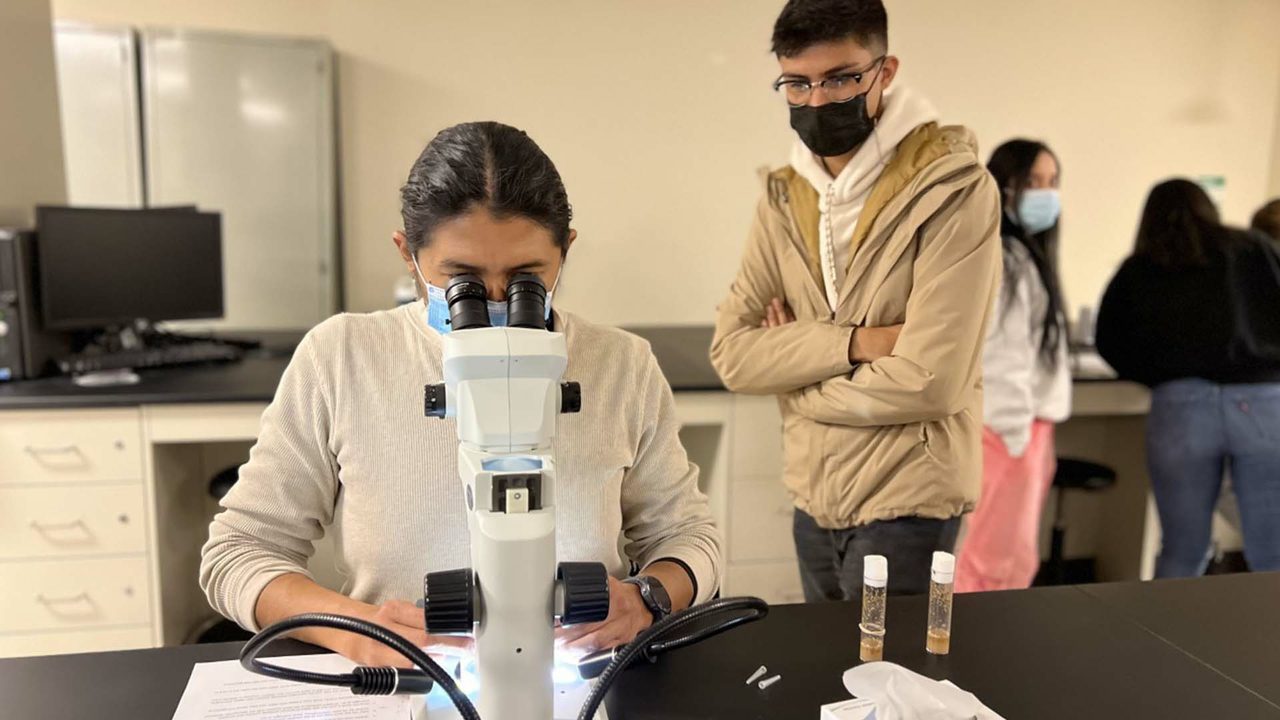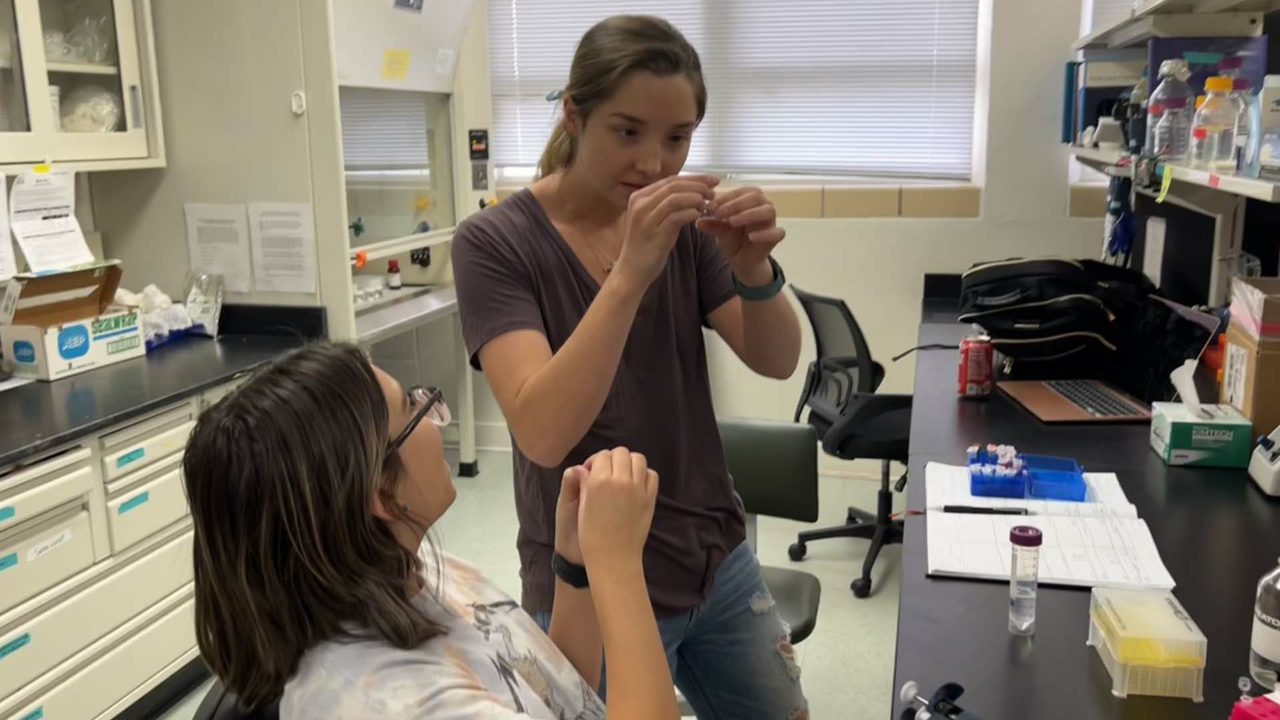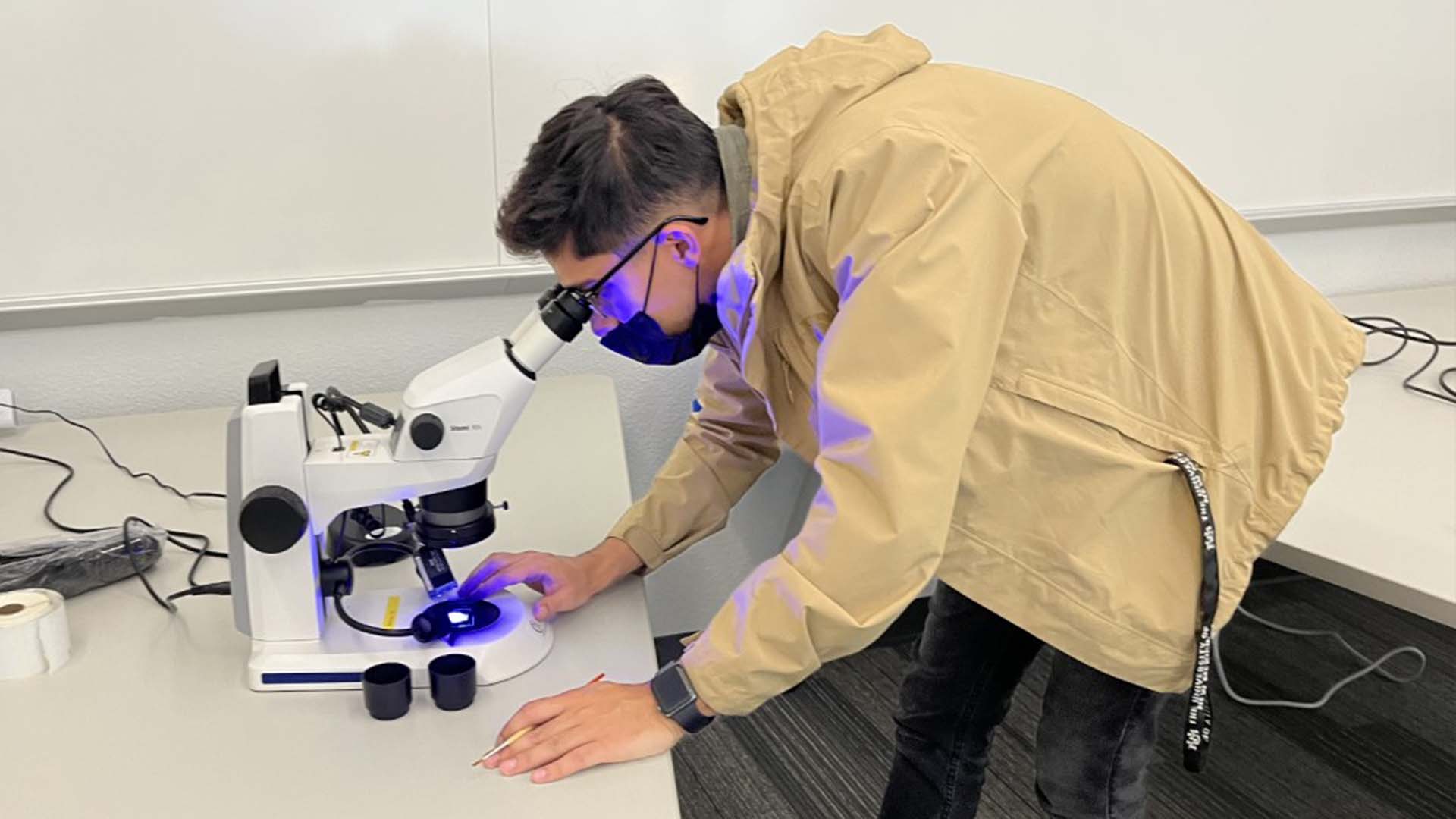
In 2021, Syed received the prestigious CAREER award from the National Science Foundation that allows him to pursue his passions of research, engaging a diverse population of undergraduate students into neuroscience research, and science outreach by visiting schools and training high school teachers and students. His project, Mechanisms regulating neural identity, connectivity and function – From stem cells to circuits, received $1.8 million over five years.
Most of the undergraduates in Syed’s lab are pursuing degrees in Biology and Biochemistry although he’d like to bring in more computer majors interested in solving biological problems. This summer, four high school students are working in the lab as well.
Working with fruit flies is a large part of the research.

After getting initial training, the undergrads pursue independent projects that mainly focus on neural stem cells, how neural stem cells generate different neural types (neurons and glia), and using 3D printed modules to measure and analyze fruit fly behaviors, Syed said.
“Some of my undergrads have published papers and some are in the process of publishing. If they start research in their first year of college, there is enough time to complete a story and publish,” Syed noted.
For example, Gonzalo Nahim Morales Chaya, who graduated in Spring 2022 with a degree in biochemistry, worked on two independent projects: investigating how cell cycle regulates the precise temporal gene expression within neural stem cells, and the roles of a conserved gene in forming sleep neurons and behavior. He presented his work at the Genetic Society of America annual Drosophila Research Conference in San Diego and received the Victoria Finnerty Travel Award, which supports conference-attendance costs for selected undergraduate GSA members who are presenting research. He is currently spending a summer in at the University of Oregon where he is part of the SPUR UO program. On his return, he will continue for a year as research assistant and then apply to grad school.
“If I have been able to see further in science, it is because Dr. Syed convinced me that I was capable of it,” Chaya said. “He did not only change my way of thinking about science but has also pushed me to overcome failure and trust my capacities. After working in his lab, I am convinced I want to continue my passion for exploring brain and enter a Ph.D. program.”

“I feel at home when in the lab, thanks to Syed and my Ph.D. student mentor Aisha Hamid for mentoring me and giving me this life-changing opportunity,” she said.
“There is so much research that needs to be done in this world we live in, and this lab is only focusing on neural diversity, which is so complex itself. This is groundbreaking research that is happening here about the body’s most complicated organ, and I’m thrilled to be a part of it.”
–Lindsey Thomas, NeuroCURE lab student
Lindsey Thomas explained why her research in Syed’s neurogenetics lab (NeuroCURE), a discovery-based class where students learn and pursue original research, is important to her.
“I’m from a smaller town of New Mexico and did not have access to the scientific research. I came to UNM and finally found my niche in research while working on my bachelor of science degree in Biology. I first met Dr. Syed by contacting him to join his journal club NeuroDeGen, which would give me upper-division credit. Once I met him in person, he quickly realized I had very little mentorship for what I want to pursue, and he allowed me to join his NeuroCURE class.”
During the class, Thomas learned about the model organism Drosophila Melanogaster and started a project investigating genes that are homologous, or similar to human genes known to be associated with degenerative neural diseases.

“There is so much research that needs to be done in this world we live in, and this lab is only focusing on neural diversity, which is so complex itself. This is groundbreaking research that is happening here about the body’s most complicated organ, and I’m thrilled to be a part of it,” Thomas said.
Junior Brandi Hess has received a U-RISE MARC award through the National Institutes of Health for her work in Syed’s lab. She is the mother of an 8-month-old son William and hopes to be a role model for other students.
“Being an undergraduate wanting to get into research can be difficult and even daunting to know where to start,” Hess said. “I had been looking for information and ways to get into a lab or even figure out what I was interested in for quite some time before having the opportunity to get into Syed’s lab. Since being in the lab, even after a short time, I have developed the confidence to do my own research on a topic of interest and learned so much about topics that I have spent years studying in classes. Having a pragmatic approach to learning has been more effective than the time I have spent taking exams and studying in lectures. Alternatively having the space to learn from graduate students has been extremely helpful to navigate what it will take to enter a graduate program.”
Hess said that with the URISE scholarship and the experience she gained through Syed’s lab she plans to apply for a Ph.D. program and continue her research as a career be in academics or a private lab.
Ethan Cato Wilson also graduated this Spring 2022 with his bachelor of science degree in Biochemistry.
“Working in Syed’s Neural Diversity lab has been a fantastic opportunity to get the hands-on lab experience I had missed due to the COVID-19 pandemic. Conducting the dissection and mounting protocols on Drosophila larvae helped bridge the gaps in my knowledge of neuronal development. I was also able to meet Dr. Andrea Gomez, who is a Laguna Pueblo neuroscientist with a lab in Berkeley, California. Being a Navajo myself, she has continued my inspiration to pursue a career in neuroscience as there are only a few Native Americans in the pioneering field of science.”
Wilson plans to continue working with Syed in his neural diversity lab to further understand the molecular mechanisms regulating proper brain development.
Carolina Valderrama Hincapie is a junior undergrad in Biology. She joined Syed’s class because she was interested in research and had a friend who works in his lab. In class, she worked with genes that were previously correlated with the development of Alzheimer’s disease and tested the expression in both larval and adult brains by using immunostaining and genetic techniques.
“I was very lucky to be part of the class, Dr. Syed taught us many things that I did not know about the life of a researcher, and all the things that being a scientist comes with. He had guests in the class, and we were able to ask questions about their research, but also about their lives and what they did to get where they were. After taking the class, I understood that being a researcher is more than being in a lab, and I got even more excited about pursuing a career in research, because there are many things that we do not know yet,” she said.
The students trained in the lab will be able to pursue a variety of exciting science related careers such as academia, industry, science writing, data scientist, medicine, and lab management, to mention a few, Syed said. Beyond his lab boundaries, he has started an informal mentorship program NEURONAL and he suggests all interested students to be part of it.
Syed hopes that the undergraduate researchers take away from his lab the experiences and training that will help them “think like a scientist, work like a scientist, and be a scientist, and the pure joy of exploration, innovation, and curiosity which are a driving force for our passion to pursue science.”
These training, mentoring, science outreach, and education efforts are part of the Pueblo Brain Science: Building Diversity in Neuroscience program, he added.
See the diverse scientists working in the neural diversity lab here and email FlyGuy@unm.edu for more information about the programs and research.
Image: Drosophila art by Aisha Hamid
Related articles
